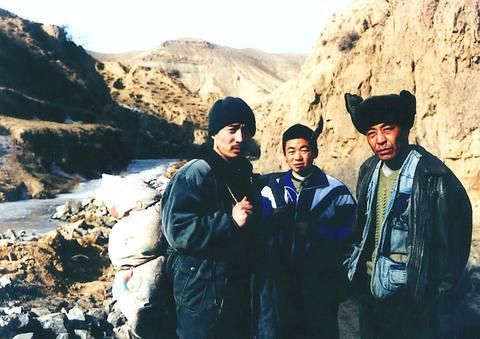Blind Shaft (盲井) toured various international film festivals last year and the debut film of director Li Yang (李楊) won dozen of awards, impressing critics with its broad and powerful themes.
It is different from the work of other so-called fifth-gene-ration filmmakers -- whose works are sometimes criticized for being stereotypical of Chinese filmmakers -- and Li tells the story in an almost documentary style, but with the help of an excellent script to provide a solid plot.
Based on the short novel Shen Mu (神木) by Lao She (老舍), Blind Shaft is a tale of greed and compassion. Two itinerant miners, Song Jinming and Tang Chaoyang risk their lives working under dangerous conditions and develop questionable morals in order to survive.

PHOTO COURTESY OF MATA
The film begins in the dark caves of one of the many illegal Chinese coal mines, where Song and Tang are working with Tang's brother Chaolu, who has just arrived. In the depths of a mineshaft, the two kill Chaolu with a pickax and engineer the collapse of a mine wall to make Chaolu's death look like an accident. Song and Tang then go on to extort money from the mine's management, who are under pressure to cover up the
accident.
After leaving with their hush money, the pair spend their ill-gotten gains on women and song and in time find another potential victim, this time an innocent 16-year-old boy named Yuan Fengming, who has been forced to quit school due to his father's disappearance. Tang agrees to help Yuan find a job at a coal mine, but only under one condition -- he must agree to pretend to be Song's nephew.
The three find another illegal mine where the working conditions are even worse. "Take it or leave it. The only thing that China doesn't have is a shortage of people," the foreman says.
This time, Song and Tang's scheme does not go so well. As the pair befriend Yuan, the boy's simplicity and naivete alters the partners' relationship and there is a surprise ending.
Wang Shuangbao (王雙寶) vividly plays the mean and cold-hearted Tang and Li Yixiang (李易祥) performs admirably in the role of Song, whose conscience is pricked by the goodness of Yuan. As for Wang Baoqiang (王寶強), who plays the role of the young victim, it is such a natural performance that it is hard to believe that he is a first-time actor.

Taiwan has next to no political engagement in Myanmar, either with the ruling military junta nor the dozens of armed groups who’ve in the last five years taken over around two-thirds of the nation’s territory in a sprawling, patchwork civil war. But early last month, the leader of one relatively minor Burmese revolutionary faction, General Nerdah Bomya, who is also an alleged war criminal, made a low key visit to Taipei, where he met with a member of President William Lai’s (賴清德) staff, a retired Taiwanese military official and several academics. “I feel like Taiwan is a good example of

March 2 to March 8 Gunfire rang out along the shore of the frontline island of Lieyu (烈嶼) on a foggy afternoon on March 7, 1987. By the time it was over, about 20 unarmed Vietnamese refugees — men, women, elderly and children — were dead. They were hastily buried, followed by decades of silence. Months later, opposition politicians and journalists tried to uncover what had happened, but conflicting accounts only deepened the confusion. One version suggested that government troops had mistakenly killed their own operatives attempting to return home from Vietnam. The military maintained that the

Before the last section of the round-the-island railway was electrified, one old blue train still chugged back and forth between Pingtung County’s Fangliao (枋寮) and Taitung (台東) stations once a day. It was so slow, was so hot (it had no air conditioning) and covered such a short distance, that the low fare still failed to attract many riders. This relic of the past was finally retired when the South Link Line was fully electrified on Dec. 23, 2020. A wave of nostalgia surrounded the termination of the Ordinary Train service, as these train carriages had been in use for decades

Lori Sepich smoked for years and sometimes skipped taking her blood pressure medicine. But she never thought she’d have a heart attack. The possibility “just wasn’t registering with me,” said the 64-year-old from Memphis, Tennessee, who suffered two of them 13 years apart. She’s far from alone. More than 60 million women in the US live with cardiovascular disease, which includes heart disease as well as stroke, heart failure and atrial fibrillation. And despite the myth that heart attacks mostly strike men, women are vulnerable too. Overall in the US, 1 in 5 women dies of cardiovascular disease each year, 37,000 of them